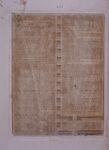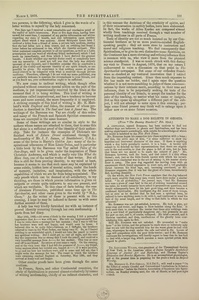< Writing Mediumship in Relation to Spirit Identity (continued from page 4-231) >
the persons operating is the chief factor in the manifestation; “the echo of our own soul, our higher spirituality, the divine unknown, the hidden prophet, the universal spirit.”
I will now cite the instance given by the Baroness von Vay, in which she received through her own hand, communications from a cousin engaged in the Austro-Prussian war in 1866, every particular thus communicated being afterwards verified. This is a case of the action of an embodied human spirit, whose identity (as we understand identity) can be proved beyond dispute. I will quote from my review of the Baroness’s work Studien uber die Geisterwelt) in The Spiritualist newspaper, May 22, 1874.
A cousin of the authoress, called W—, who was in the campaign, professed continually to give accounts of himself through the hand of the medium while his body was asleep, which accounts always agreed with subsequent letters received from him. On the 4th July W—’s spirit wrote—“We have had a great battle. I am well, but so tired.” On the 6th a letter came from W—, dated July 2nd: “We expect a decisive battle to-morrow. I have a feeling that I shall not escape, but do not fret about me; my trouble will soon be over.” A day or two afterwards W—’s name appeared among the list of those slain in the battle of K6nigratz (Sadowa), which took place on the 3rd July. On the 9th W—’s spirit again wrote: “I assure you I am not dead. I came safely through the fearful battle of Konigratz. Do not doubt my words. I will write you a letter in the flesh shortly.” Three days later the Baroness received a letter from her cousin, dated July 11th: “God and the good spirits protected me in that frightful carnage; thousands fell; 450 privates in our battalion, and two officers.”
Another interesting case of an intelligence apparently altogether apart from the medium communicating between two persons, is the following, which I give in the words of a letter written to myself by the lady concerned.
Two days ago I received a most remarkable and conclusive proof of the reality of spirit intercourse. Four or five days since, having been unwell for some time, I requested of my guides information and advice regarding my state of health, and also information upon another subject about which I was anxious. About thirty-six hours later I received a letter from a friend of mine, a private lady medium, stating that she had fallen into a deep trance, and on awaking had found a letter before her addressed to me, which she thereby enclosed. This letter contained complete answers to all my questions, as well as a Latin prescription (not one word of which my friend understood) which I had made up immediately, and from which I have derived the greatest benefit. I doubt whether any earthly doctor could so completely have met my necessity. I need not tell you that the lady was entirely ignorant of my requests, and I therefore consider this as conclusive a proof of the reality and separate identity of our spirit friends, as can possibly be given. My experience is that nothing occurs at professional seances to be compared with what is received through private mediums. Therefore, although I do not wish my name published, you are perfectly welcome to mention the circumstance to your friends, and as you know me, your authentication ought to be sufficient.
We now come to indirect writing, which though often produced without conscious mental action on the part of the medium, is yet impressionally received by the brain at the moment that it is being written. This kind of writing is sometimes called inspirational, and has a tendency to become more and more normal, the more frequently it is employed. A striking example of this kind of writing is Mr. E. Maitland’s work England and Islam, the manner of whose production is described in The Soul and how it found me. The writings of the Baroness von Yay are chiefly of this order, and many of the French and Spanish Spiritist communications are conveyed in the same manner.
Some of these writings are so similar in style to the authors whose names are attached to them, that to some this fact alone is a sufficient proof of the identity of their authorship. Take for instance the examples of Dickens’s unfinished work of Edwin Drood continued through the mediumship of Mr. J. P. James, of Brattleboro’, U.S.A.; some of the lyrics in Harris’s Golden Age; many of the inspirational utterances of Miss Lizzie Doten, and in particular a little book by the Baroness von Vay called Tales of the Sun-Rays, said to be given under the inspiration of Hans Christian Andersen, and which is really very like What the Moon Saw, one of the earlier works of that writer. But all this is still far from proving identity, to my mind at least, because it seems to me that such cases may be explained by some subtle, hidden laws of mental action, under the heads of memory, imitation, and imagination, with the whole capabilities of which we are far from being acquainted. The only proofs which can be deemed at all satisfactory, to my thinking, are those in which precise information is given on subjects or events quite unknown to any one present, and which are verifiable. To this class of facts belong the case of Abraham Florentine, published some time ago in The Spiritualist, and other cases given to the world by “M.A., Oxon.” As the writer of these is present with us this evening, I hope he may be induced to favour us with some further account of them.
A lady has very kindly furnished me with an instance of proved identity occurring through her own mediumship. I quote from her diary.
May 10th, 1865.—At seven o’clock in the evening I felt a powerful impression that A—was with me. She told me impression ally that I was to write down a message for her mamma; that I was to tell her her brothers were well and happy, and would soon be home. I believed this to be quite false—because, as I thought, the brothers referred to were in the West Indies, one being very ill. So, as I feared yielding to an untruthful spirit, I would not take the pencil to receive any spiritual writing. But I could get no rest all night, and the next day the impression was so strong that I took the pencil, and received a very beautiful message from A—for her mother. This was at once sent off to my friend. By return of post came a reply. On the evening, and at the very hour that I had felt the presence of A—, my friend, being anxious about her invalid son, begged A—, if it were possible, to go and see how her brothers were, and to come and tell me, that I might write the message for her. The vessel in which the brothers were returning reached England on Saturday, May 13th, and they arrived at home well and happy.
Other similar proofs have been given through the same medium.
In France, Spain, and other Continental countries, the study of Spiritualism is pursued almost exclusively by means of writing mediumship, chiefly of an indirect character, and in this manner the doctrines of the erraticity of spirits, and of their reincarnation in earthly bodies, have been elaborated. In fact, the works of Allan Kardec are composed almost wholly from teachings received through a vast number of writing mediums in all parts of France.
Tests of identity are not so much insisted on by our Continental brethren as by us more positive-minded English-speaking people; they set more store by instruction and moral and religious teaching. We find consequently that Spiritualism, or to give its own distinctive name Spiritism, on the Continent has a more elevating and refining influence than is common with us, who view it more from the physical science standpoint. I was so much struck with this during my visit to France in August, 1876, that on my return I endeavoured to raise a discussion on that point in The Spiritualist newspaper. But some of our orthodox friends were so shocked at my ventured innovation that I retired from the impending contest. Since then much exposure to fire has made me bolder, and I again raise the question whether it is not more ennobling to judge of these communications by their intrinsic merit, according to their tone and influence, than to be perpetually seeking for tests of the personal identity of our friends, to accept the teacher for the sake of the teaching, no matter what his name or insignia. But as this opens up altogether a different part of the subject, I will not attempt to enter upon it this evening ; perhaps some friend present may think well to enlarge upon it either now or on some future occasion.
<Untitled> (Dr. Alexander Wilder, vice-presidet of the Theosophical Society)
Dr. Alexander Wilder, vice-president of the Theosophical Society of New York, is the American editor of Payne Knight’s Symbolical Language of Ancient Art and Mythology, and Thomas Taylor’s Eleusinian and Bacchic Mysteries. He is an accomplished physiologist, and at the present time is preparing for the press a book on Serpent Worship.
Editor's notes
- ↑ Dr. Alexander Wilder, vice-presidet of the Theosophical Society by unknown author, London Spiritualist, No. 288, March 1, 1878, p. 101
Sources
-
London Spiritualist, No. 288, March 1, 1878, p. 101


